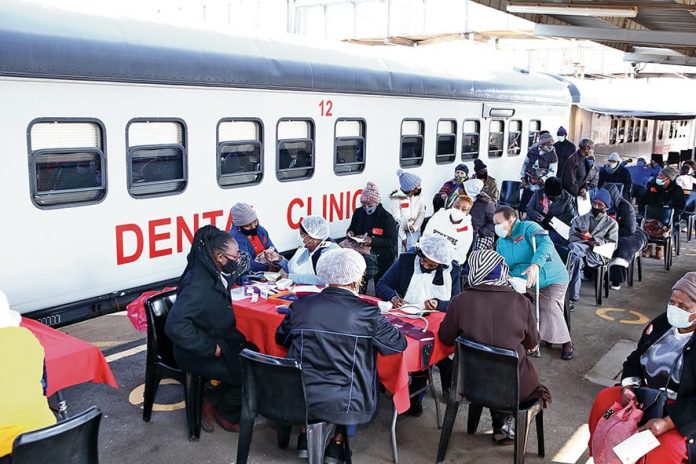Johannesburg – The Phelophepa train has for the past 27 years provided health services to many rural areas.
Since the Covid-19 pandemic hit last year, they have extended its 36-week journey across South Africa by another three weeks.
In recent years, it extended its services to cover peri-urban areas or areas where healthcare infrastructure is facing challenges, with all nine provinces now making up its journey.
Last week, it arrived at the Dube station in Soweto, where Covid-19 vaccines were also administered.
The train first came to Gauteng as Covid-19 infections spiked in November last year. Shamona Kandia of the Transnet Foundation, which owns and operates the train, said it started in 1994 as a three-coach eye clinic project.
She said the vision was to provide quality medical care to the most remote communities, where there’s often only a single doctor for every 5 000 people.
It gradually expanded by adding other clinical services, including dentistry, expanded optometry, psychology and a pharmacy.
Our #Trainofhope eye clinic doing what they do best – helping pic.twitter.com/7jIZ0oRbRH
— Train of Hope (@phelophepa) November 14, 2017
In 2012, a second Phelophepa train was added. Kandia said to date they have assisted up to 375 000 people every year, treat 90 000 patients and write up to 68 000 prescriptions.
“In conjunction with our outreach programmes, we have reached 20-million people since inception,” she said. She explained that with the virus outbreak they had to integrate Covid-19 education.
Phelophepa also offers Covid- 19 testing services, which Kandia explained are managed by the local district health departments for alignment to the Covid-19 provincial management strategies. And since the vaccine roll-out, they managed to vaccinate just over 400 people.
“Unfortunately, the uptake with older persons is not what it should be, there seems to be a reluctance from their part.” She said that though the services on Phelophepa support and align to government healthcare services, it is not a government- sponsored project.
“We go to all provinces in an effort to alleviate the backlogs faced by health facilities, especially with optometry and dentistry. The on-board staff are contracted, paid employees of the company,” she said.
“Wherever the train travels to, we create temporary employment for at least 60 people in the categories of nurses, translators and general cleaners.” The busiest of their clinics are their eye clinics, followed by dental and health.
“We have recorded an alarming number of patients presenting with various forms of cancer and diabetes over the years, so we have two dedicated mass cancer and diabetes campaigns per province.”
She urged people to make use of the service.
All screening processes are free for health, dental and eye care. Patients only pay R5 for medication per script (up to six items per script); R10 for a tooth extraction and R30 per pair of prescription spectacles.
Also read:
President’s daughter a vandal after ripping expensive clothes to shreds, claims ex
CR17 ruling inflames hostilities between Maimane, Steenhuisen
Zuma is our hero — say police at Nkandla
Guptas stranded in Dubai as SA refuses to issue new passports
Follow @SundayWorldZA on Twitter and @sundayworldza on Instagram, or like our Facebook Page, Sunday World, by clicking here for the latest breaking news in South Africa. To Subscribe to Sunday World, click here.
Sunday World




